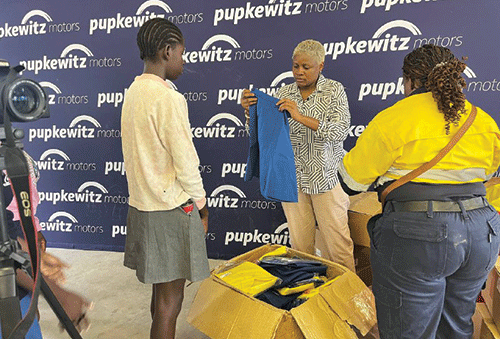The Women in Media Organisation handed over school uniforms, sanitary products, toiletries and school bags with stationery to learners at the Tsumkwe Secondary School on Monday.
This support was provided through the assistance of Rossing Foundation, Pupkewitz Motors, Uranium One Group, Multichoice Namibia, the Blush Foundation, One Economy Foundation, Agra Staff Initiative Fund and the National Youth Council.
Journalist Jemima Beukes, the co-founder of the organisation, said during their engagement with the school principal and community leaders at that school, it was highlighted that some San learners face challenges staying in school due to the lack of school uniforms.
Additionally, it was noted that sanitary products are insufficient for young girls, and even working women with salaries often struggle to cover the costs of pads and toiletries.
Furthermore, the provision of under-arm deodorant and soap to learners aims to encourage self-care, as children may face teasing if their mouths or armpits have unpleasant odours.
“Limba Mupetami (WIM co-founder) grew up in Tsintsabis, where she lived closely with the San and saw first-hand how they are living. I have for long reported on the exclusion and dispossession of the San. A year ago, we thus tried to go there as journalists to get a deeper insight, but we could not afford to be out of the office for more than a day. So, after some time, we decided to work on an outreach so that we could also bring a bit of help, and not only go and take information from an already downtrodden people,” said Beukes.
She added that their main objective is certainly to boost the San children so that they know they matter, and that they too have a right to education, and most importantly that they have a right to education, even if they do not have the school uniform or the money to pay for application forms or school fees.
Beukes noted that WIM has developed good relations with the organisations that they reached out to when they started with their annual WIM conference three years ago, so rallying support was not so much of a challenge.
“As a non-profit organisation that works only for the betterment of women and young girls, we have no money for ourselves. So, these organisations assisted us to get the necessary items that we needed to make a difference,” she stated.
“It is of paramount importance to understand that equality means lifting those who are lagging behind to stand on an equal footing. That is not the case with the San right now. They have for long endured exclusion, being deliberately marginalised onto the peripheries of society. Our primary emphasis is on San children, recognising and addressing the challenges they face,” Beukes added.
She said Namibia celebrated when their first batch of home-grown doctors treated them in local hospitals, able to communicate with them in their local languages. “Imagine this for the San,” she observed.



